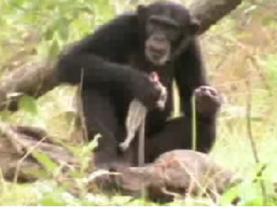
A chimp eating a monkey she killed with a spear. The beginning of the end for humans?
Chimpanzees could pose stiff competition for humans. Pound for pound they’re much stronger than us puny Homo sapiens, and they’re extremely intelligent too; capable of complex problem solving, innovation and deception1. Some of them have even invented the spear and started living in caves. And to make matters worse we’re teaching some how to make fire. But could chimps ever make a serious bid for dominance of the earth, planet of the apes style?
I don’t think so, for one simple reason: the ratchet effect. This is a phenomena present throughout human cultures, but conspicuously absent in chimpanzees. It’s a fairly simple principle: somebody invents a tool, behavior or technique and other people copy them. Some of these people may figure out a better way of doing whatever it was that was invented. Maybe they find a way to make a spear deadlier, or require less raw material to create. Then people copy this better version; and it gets improved by others again2. Ideas are built upon and improved, “ratcheting” up the overall technology of a group. It’s how we went from the first powered flight to landing on the moon in less than 100 years.
Now chimpanzees are smart and can innovate, as I said in the introduction. I wouldn’t lie to you lovely people after all. And ideas do spread from chimp to chimp. However, they spread in a slightly different way than in humans, and this really hampers their ability to ratchet up technology. Whilst humans tend to learn from another person, either by being taught or imitation, chimps appear to learn from the problem being solved3. If you saw someone pick up a rock, rub it between their hands and then use it to crack a nut; you’d probably imitate every step if you also wanted to smash a nut (for revenge, nuts dishonoured your family name).
Conversely, chimps see that there is a problem here (nut needs smashing, for honour) and that a rock is involved in it’s solution. Then they’d figure out a way to to smash the nut with a rock. In other words, they other individual is drawing their attention to a problem and it’s solution, which they then independently figure out. They don’t learn directly from the “teacher”. As a result they’d probably miss out any unnecessary steps (rubbing the rock) since they’re coming up with their own solution to the problem, rather than just imitating another4.
Researchers have had a lot of fun with this fact, tricking humans into doing all sorts of unnecessary things to solve problems whilst a chimp will cut straight to the heart of the issue and solve it3,4. And then maybe laugh at the silly humans, rubbing rocks for no good reason. Whatever next, dancing to try and cause rain? Although this does mean chimps will be very efficient, it also means that every innovation has to be independently re-invented by every chimp. So if it’s a chimp-genius (those do exist) whose figured out a new way of doing things, it won’t spread. Or if a chimp thinks of an extra step to make a solution more better, other chimps might not realize and copy it. After all, what if rock rubbing turned out to be useful? Maybe it heats up the rock, causing massive damage to those devious nuts!
There are a bunch of other factors which can bias whether a chimp will learn something too. For example, they’re more likely to try and learn (in their special way) from a high ranked member of a group than a low ranked member5. Or from a family member6. If that chimp genius turns out to be an orphan with no social standing then it’s unlikely their great new ideas will spread. They also seem to prefer to use the strategy they learnt originally, unless they see a new one that offers substantially more rewards7. Minor tinkering and refinement doesn’t seem to spread. Chimps would be having none of that iPhone 5 to 5s crap; they’d want substantial upgrades.

Some of the tools made by chimps thousands of years ago
And sure enough, their technology doesn’t ratchet up like ours does. Archaeologists excavated a place chimps had been living for thousands of years; and found that over the course of that period their technology had not changed. They were still using the same tools in the same way they had been for over 4,000 years. Meanwhile just look at what humans have achieved in that time. 4,000 years ago we were finishing off stonehenge. Now we can photograph it from space.
Now, chimps are still very smart. And these factors don’t stop innovation spreading when it’s brand new or a really big improvement (like spears). In fact, analysis of chimp culture has shown that they’ve had plenty of innovations which caught on. It just means there’s very little iteration on existing technology; and what little there is doesn’t readily accumulate over time. It would be the equivalent of if we invented the aeroplane; but didn’t improve it at all until the jet engine was invented. Which probably couldn’t be invented without such improvements on the original design. That iteration is really important for technological advance.
This fairly minor difference in learning results in some fairly major differences in technology; stopping them ratcheting it up to levels that could pose a threat to humans. And this is why you don’t have to worry about an ape uprising. At least not until they start to learn from one another. That’s the time to panic.
References
- Povinelli, D. J., & Vonk, J. (2003). Chimpanzee minds: suspiciously human?.Trends in cognitive sciences, 7(4), 157-160.
- Tennie, C., Call, J., & Tomasello, M. (2009). Ratcheting up the ratchet: on the evolution of cumulative culture. Philosophical Transactions of the Royal Society B: Biological Sciences, 364(1528), 2405-2415.
- Nagell, K., Olguin, R. S., & Tomasello, M. (1993). Processes of social learning in the tool use of chimpanzees (< em> Pan troglodytes</em>) and human children (< em> Homo sapiens</em>). Journal of Comparative Psychology,107(2), 174.
- Horner, V., & Whiten, A. (2005). Causal knowledge and imitation/emulation switching in chimpanzees (Pan troglodytes) and children (Homo sapiens).Animal cognition, 8(3), 164-181.
- Horner, V., Proctor, D., Bonnie, K. E., Whiten, A., & de Waal, F. B. (2010). Prestige affects cultural learning in chimpanzees. Plos One, 5(5), e10625.
- Tomasello, M., Call, J., Nagell, K., Olguin, R., & Carpenter, M. (1994). The learning and use of gestural signals by young chimpanzees: a trans-generational study. Primates, 35(2), 137-154.
- Hrubesch, C., Preuschoft, S. and van Schaik, C. (2009). Skill mastery inhibits adoption of observed alternative solutions among chimpanzees (Pan troglodytes).Animal Cognition, 12(2), pp.209–216.

